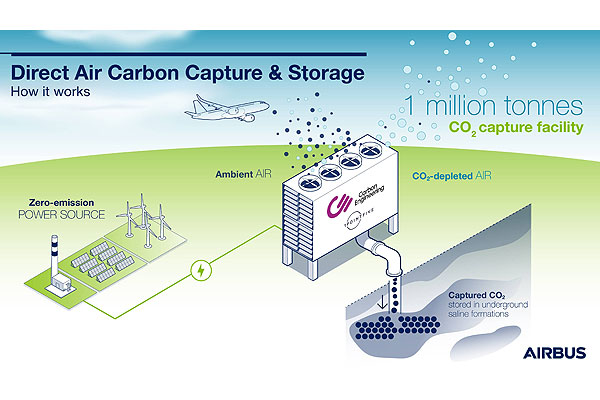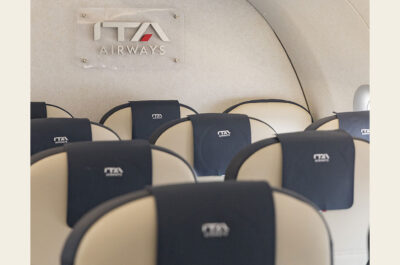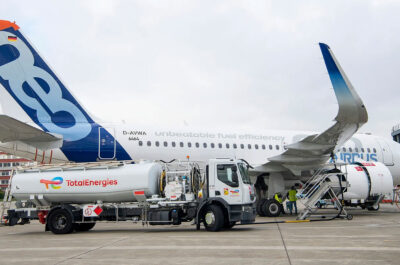Carbon removals via direct air capture technology complement other solutions that deliver CO2 reductions, such as Sustainable Aviation Fuel (SAF), by addressing remaining emissions that cannot be directly eliminated.
FARNBOROUGH – Airbus and a number of major airlines – Air Canada, Air France-KLM, easyJet, International Airlines Group, LATAM Airlines Group, Lufthansa Group and Virgin Atlantic – have signed Letters of Intent (LoI) to explore opportunities for a future supply of carbon removal credits from direct air carbon capture technology.
Direct Air Carbon Capture and Storage (DACCS) is a high-potential technology that involves filtering and removing CO2 emissions directly from the air using high powered fans. Once removed from the air, the CO2 is safely and permanently stored in geologic reservoirs. As the aviation industry cannot capture CO2 emissions released into the atmosphere at source, a direct air carbon capture and storage solution would allow the sector to extract the equivalent amount of emissions from its operations directly from atmospheric air.
Carbon removals via direct air capture technology complement other solutions that deliver CO2 reductions, such as Sustainable Aviation Fuel (SAF), by addressing remaining emissions that cannot be directly eliminated.
As part of the agreements, the airlines have committed to engage in negotiations on the possible pre-purchase of verified and durable carbon removal credits starting in 2025 through to 2028. The carbon removal credits will be issued by Airbus’ partner 1PointFive – a subsidiary of Occidental’s Low Carbon Ventures business and the global deployment partner of direct air capture company Carbon Engineering. Airbus’ partnership with 1PointFive includes the pre-purchase of 400,000 tonnes of carbon removal credits to be delivered over four years.
“We are already seeing strong interest from airlines to explore affordable and scalable carbon removals,” said Julie Kitcher, Executive Vice President Communications and Corporate Affairs, Airbus. “These first letters of intent mark a concrete step towards the use of this promising technology for both Airbus’ own decarbonisation plan and the aviation sector’s ambition to achieve net-zero carbon emissions by 2050.”
“We’re excited to partner with Airbus. Carbon removal credits from direct air capture offer a practical, near-term and lower cost pathway that enables the aviation industry to advance its decarbonisation goals,” said Michael Avery, 1PointFive’s President.
“Air Canada is proud to support the early adoption of direct air capture and storage as we and the aviation industry move forward on the path to decarbonisation,” said Teresa Ehman, Senior Director, Environmental Affairs at Air Canada. “While we are in the early days of a long journey and much remains to be done, this technology is one of the many important levers that will be needed, along with many others, including sustainable aviation fuel and increasingly efficient and new technology aircraft, to decarbonise the aviation industry.”
“Sustainability is an integral part of the Air France-KLM Group’s strategy. While we activate all levers already at our disposal to reduce our carbon footprint – including fleet renewal, SAF incorporation and eco-piloting, we are also active partners in research and innovation, advancing knowledge on emerging technology in order to improve its price and efficiency. In addition to CO2 capture and storage, the technology opens up very interesting perspectives for the production of synthetic sustainable aviation fuel. The letter of intent we are signing with Airbus today embodies the collaborative approach the aviation industry has initiated to find effective solutions that meet the challenge of our environmental transition. Only together can we address the climate emergency,” said Fatima da Gloria de Sousa, VP Sustainability Air France-KLM.
Jane Ashton, easyJet’s Director of Sustainability, said: “Direct air capture is a nascent technology with a huge potential, so we are very pleased to be part of this important initiative. We believe that carbon removal solutions will be an essential element of our pathway to net zero, complementing other components and helping us to neutralise any residual emissions in the future. Ultimately, our ambition is to achieve zero carbon emission flying, and we are working with partners across the industry, including Airbus, on several dedicated projects to accelerate the development of future zero carbon emission aircraft technology.”
Jonathon Counsell, IAG´s Head of Sustainability, said: “Our industry’s transition will require a variety of solutions, including new aircraft, sustainable aviation fuels and emerging technologies. Carbon removal will play an important role in enabling our sector to achieve net-zero carbon emissions by 2050.”
“DACCS represents an innovative way not only to remove net carbon from the atmosphere, but it also has the potential to play a part in the development of synthetic sustainable aviation fuels,” said Juan José Tohá, Corporate Affairs and Sustainability Director, LATAM Airlines Group. “There is no silver bullet for decarbonising the industry and we will rely on a combination of measures to reach our net-zero ambitions, including greater efficiencies, sustainable aviation fuels and new technologies, supported by the conservation of strategic ecosystems and quality offsets.”
Caroline Drischel, Head of Corporate Responsibility of Lufthansa Group said: “Achieving net-zero carbon emissions by 2050 is key for the Lufthansa Group. This involves billion euro investments in continuous fleet modernisation and our strong commitment to Sustainable Aviation Fuels. In addition we are exploring new technologies, like advanced and safe carbon capture and storage processes.”
Holly Boyd-Boland, Virgin Atlantic’s VP Corporate Development, said: “Reducing Virgin Atlantic’s carbon footprint is our number one climate action priority. Alongside our fleet transformation programme, fuel-efficient operations and supporting the commercial scalability of sustainable aviation fuels, the removal of CO2 directly from the atmosphere through innovative carbon capture and storage technologies becomes a powerful tool in reaching our target of net-zero carbon emissions by 2050. We look forward to partnering with Airbus and 1PointFive to accelerate the development of Direct Air Carbon Capture and Permanent Storage solutions alongside our industry peers.”
According to the Intergovernmental Panel on Climate Change (IPCC), carbon removal is required to help the world go beyond climate mitigation and to support the achievement of net-zero targets. In addition, according to the Air Transport Action Group’s (ATAG) Waypoint 2050 report, offsets (mainly in the form of carbon removals) will be needed – between 6% and 8% – to make up any remaining shortfalls in emissions above the goal.
Vicky is the co-founder of TravelDailyNews Media Network where she is the Editor-in Chief. She is also responsible for the daily operation and the financial policy. She holds a Bachelor's degree in Tourism Business Administration from the Technical University of Athens and a Master in Business Administration (MBA) from the University of Wales.
She has many years of both academic and industrial experience within the travel industry. She has written/edited numerous articles in various tourism magazines.






























































































































































































































